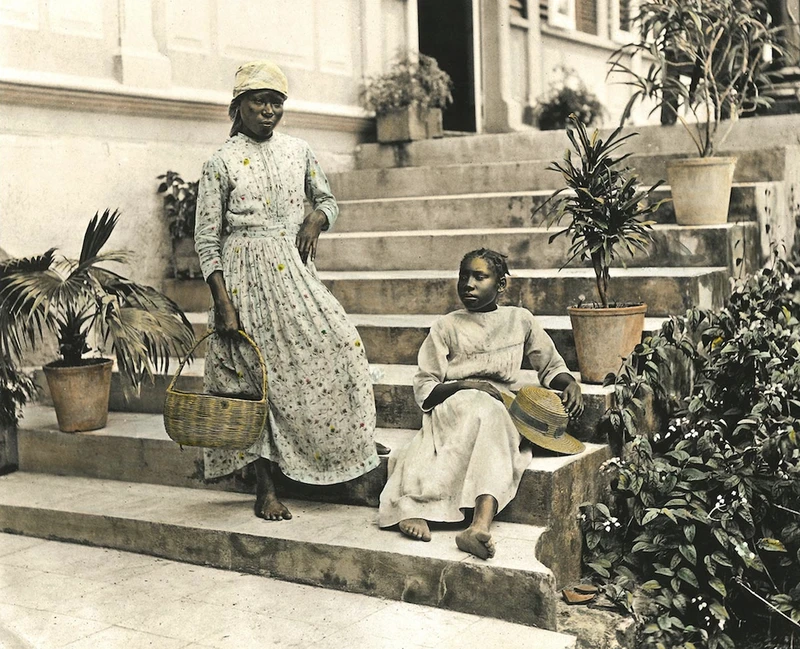Ingrid Pollard: Carbon Slow Turning
11 Mar-29 May 2022


A major survey of Guyanese-born British artist and photographer Ingrid Pollard will be presented at MK Gallery next year (12 March – 29 May 2022) - the first exhibition to fully explore Pollard’s pioneering and experimental practice, from the 1980’s to the present day, and examine her substantial contribution to British art.
Ingrid Pollard is renowned for using photography as social practice, working with portrait and landscape photography to question our relationship with the natural world and interrogate social constructs such as Britishness, race, sexuality, and identity. Working across a remarkable variety of techniques, from photography, printmaking, drawing and installation, to artist books, video, and audio, Pollard’s practice combines meticulous research and experimental creative processes to make art that is at once deeply personal and socially engaged, addressing issues that are urgent and relevant today: the human body, race and migration, our relationship with the natural world.
A profound interest in the processes of photography has been a constant throughout Pollard’s career. She has experimented with digital and analogue methods, often using Victorian photographic processes, developing images on wood, fabric and slate.
Throughout her career Pollard has documented the English landscape, uncovering hidden and unseen histories and stereotypes. Her work often presents evidence gathered over long periods of research in which she observes and explores a particular place, often imbedded within the community who live and work there. Much of her work is created on residencies away from home, exploring ideas of representation, landscape, and identity.
The exhibition at MK Gallery, supported by Freelands Foundation through the Freelands Award, will be the first to present an overview of Pollard’s career to date, featuring works from important series from the past 40 years alongside new work. In Pastoral Interlude (1987), a series of hand-tinted photographs depicting black people in rural settings such as the Lake District offset traditional idyllic representations of the English landscape against unseen histories of exclusion, challenging the stereotype of black people as primarily associated with urban environments. Made thirty years after Pastoral Interludes, in the series Valentine Days(2017) Pollard applied this same hand-tinting technique to late 19th century images produced by Valentine & Sons, originally created to promote Jamaica as a destination for redevelopment, an archive Pollard continued to explore during her time as the inaugural Stuart Hall Foundation Fellow at the University of Sussex.
The exhibition will also feature important works from the 1990s and Pollard’s interest in representations of the body and sexuality, including Deny: Imagine: Attack (1991), in which fragmented images of the body are overlaid with scientific, homophobic remarks, and Contenders (1995), a series of life-size fragmented photographs of the male body that question the hyper-masculinity of the boxer. The exhibition will also present some of Pollard’s most enduring projects, created over decades of extensive research. For over 30 years Pollard has identified pub signs across England which refer to or depict the figure of the African In the installation Seventeen of Sixty Eight (2019), photographs of these figures reveal this overlooked aspect of English history alongside related objects and texts. For the exhibition at MK Gallery, Pollard has continued her experimentation with ‘the body’, presenting a new kinetic sculptural installation inspired by characters in colonial films. The sculpture is made from familiar found objects and materials including furniture, rope, and saws, using their sounds and movements in errie, unfamiliar ways.
Pollard was one of the first artists involved in the Black British art movement in Britain, participating in numerous seminal group exhibitions in the 1980s including Black Women: Time Now, Battersea Arts Centre (1983) and The Thin Black Line, ICA (1985). During a time of urgent conversations between black artists, writers and thinkers exploring their relationship to Britain’s colonial past and art history, Pollard’s photographic practice, documented life in communities in London and conferences on women’s liberation and racial equality. In the 1980s she worked at Lenthall Road Workshop, a community-based feminist collective in East London that helped spread radical political campaigns and contributed to grassroots movements of feminism, anti-racism, and LGBT+ rights. She played an important role in documenting black people’s creativity and presence in 1980s Britain, including the work of performers, actors, and writers such as Alice Walker, Theatre of Black Women, , Ellen Kuzwayo, Jackie Kay, and Maya Angelou. In 1988 she was one of the 21 founder members of Autograph, an agency supporting black photographic practice and championing photography that explores issues of race, identity, representation, human rights and social justice.